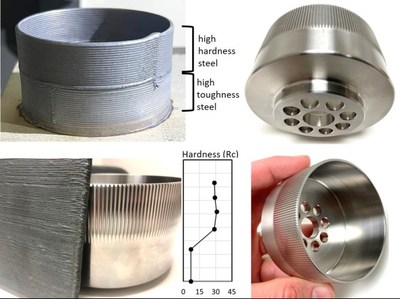Building on their previous collaboration of 3D printing large-scale strain wave gear flexsplines using directed energy deposition (DED), the partnership between Amorphology and AddiTec has now turned to the development of multi-metal, functionally-graded gear components, combining two different steels together within a single part. The three-inch diameter flexspline demonstrator is part of a zero backlash strain wave gearbox used in robotic arms and precision-motion mechanisms. The thin-walled flexspline has competing requirements of wear resistance in the teeth and a fatigue-resistant body that motivates the use of two different materials during 3D printing. The steel in the toothed region is a precipitation hardening martensitic stainless steel typically used in high-strength applications with an average hardness of 35 Rc. In contrast, the steel below the toothed region is known for high toughness with a lower average hardness. By combining the two steels strategically in a gear, it becomes possible to tailor the mechanical properties to take advantage of the benefits of each alloy.
Through its exclusive licensing agreement, Amorphology is developing its intellectual property around multi-metal 3D printing, specifically functionally graded metals, which allows for the strategic transition between more than one metal during 3D printing to produce multi-functional parts that are free from cracks and unwanted phases. The core technology, developed over a decade ago at JPL, focuses on the design of multi-metal transitions to achieve predictable mechanical or physical properties in the printed part. Unlike conventional claddings or overlays, functional grading aims to achieve the best possible properties at the interface between dissimilar metals or composites in a 3D printed part, which is useful for preventing failures such as those caused by thermal mismatch or fatigue cracks. Tailoring the interface between different metals during printing can be achieved through diffusion at the interface by allowing the disparate metals to mix or by adding one or more intermediate compositions at the transition. The prototype developed in the current partnership was produced through wire-fed DED by printing the base of the gear from high-toughness steel and then sharply transitioning to the high hardness steel at the vertical location where the teeth begin, using the melt pool to diffuse the layers. The materials could have also been transitioned by mixing powders of the two materials in the powder-blown configuration of the DED printer.
"Functional grading with multiple materials allows us to develop gear components for robotics that cannot be fabricated with conventional metallurgy. The ability to tailor the properties of a gear via alloy composition gives us an entirely new design freedom when developing precision mechanisms," said Dr. Glenn Garrett, Amorphology CTO. "Whether it's improving the wear resistance of gear teeth while maintaining toughness in the rest of the part or using high-value steel in combination with low-cost steel to save cost, multi-material additive manufacturing is allowing us to innovate in the way that we approach gears for robotics. We can tailor properties for machinability, cost, hardness, strength, corrosion resistance, even density. For large gears where it makes sense to use additive manufacturing to save machining costs, this could be a real advantage."
"Meltio's dual-wire DED technology provides an ability to change from one material to another material automatically during the fabrication of metal components. This results in gradual change in properties and functions which can be tailored for enhanced performance," said Dr. Yash Bandari, Business Development Manager at AddiTec.
The multi-metal flexspline demonstrator from Amorphology and Additec is designed so that the high-performance high-hardness steel resides in the gear teeth and the rest of the cup is made from highly machinable tough steel. The as-printed hardness of the gear teeth through DED was measured to be around 30 Rc while the base of the cup measured at around 7 Rc (87 Rb). A further increase of the gear teeth hardness is possible through subsequent heat treatment. Future work will focus on different combinations of steels, and the development of localized heat-treating strategies to optimize the properties of each metal in the bi-metallic gear. Amorphology is actively developing other applications for functionally graded metals in applications such as thrusters, rockets, robotics, and gears, and is seeking partners for further development and licensing.
To learn more about this project email or call:
Peter Czer-
Email Contact / 310.560.7793
Headquartered in Pasadena, California, Amorphology is a NASA JPL/Caltech spinoff with exceptional lineage and intellectual property developed as part of the space program. Amorphology is a leader in applying advanced materials and manufacturing technologies toward improving gear production for robotics and other industrial applications using amorphous metals, also known as bulk metal glass (BMG), additive manufacturing, and custom metal alloys and composites.
AddiTec is a founding partner of Meltio and is proud to serve as the master reseller of Meltio's products in North America. Its focus is building an ecosystem for Meltio's technology and driving business opportunities. AddiTec has a 6-year heritage in the design and development of multi-laser metal direct deposition technology and has completed a broad range of customer installations and benchmark work, as well as providing training and customer application support. AddiTec's customers include prominent universities, major research centers, technology centers, national laboratories, and a wide range of industrial customers in the aerospace, nuclear, automotive, mining and energy sectors. For more information, visit us at https://www.additec.net/
For more information, licensing, or partnerships:
Amorphology, Inc
Peter Czer
Director of Strategy, Partnerships & Technology
www.amorphology.com
E:
Email Contact
P: 310.560.7793
![]() View original content to download multimedia:
https://www.prnewswire.com/news-releases/amorphology-partners-with-additec-for-the-additive-manufacturing-of-multi-metal-robotics-gear-components-301536538.html
View original content to download multimedia:
https://www.prnewswire.com/news-releases/amorphology-partners-with-additec-for-the-additive-manufacturing-of-multi-metal-robotics-gear-components-301536538.html
SOURCE Amorphology
| Contact: |
| Company Name: Amorphology, AddiTec
|










